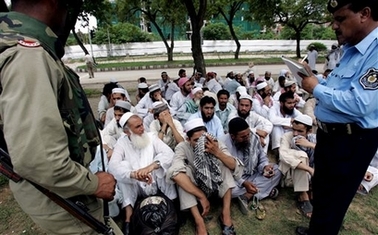Asia-Pacific
Hundreds surrender at Pakistani mosque
(AP)
Updated: 2007-07-05 01:06
 |
Large Medium Small |
 A police officer, right, collects information of religious students after their surrender near Lal mosque Wednesday, July 4, 2007 in Islamabad, Pakistan. Leaders of a besieged radical mosque in the Pakistani capital remained defiant as a deadline calling for their immediate surrender passed Wednesday, a day after clashes there killed at least 10 people. [AP]  |
Sporadic firing erupted around the mosque and an adjacent women's seminary in the early evening while three helicopter gunships circled overhead. Clashes killed at least 16 people Tuesday, officials said.
Minister of Information Mohammed Ali Durrani said that "a few hundred" militants could remain inside the mosque, whose clerics have challenged the government by trying to impose a Taliban-style version of Islamic law in the capital.
One of those who decided to give up, 15-year-old Maryam Qayyeum, said many were not leaving the seminary. "They are happy. They only want martyrdom. They don't want to go home," she said.
The militants had been ordered by the government to lay down their arms and surrender by 11 a.m. Wednesday, following a day of clashes between security forces and militants living inside the sprawling mosque compound.
All women and children who surrender will be granted amnesty, but males involved in killings and other crimes as well as the top mosque leaders would face legal action, said Deputy Information Minister Tariq Azim.
"The deadline has expired but we are not going to start any action immediately. We do not want bloodshed. We are reasonably sure that better sense will prevail," said the capital's top security official Khalid Pervez.
He said the government is giving about $83 to each person who surrenders to help them return home.
As the deadline passed, the mosque's deputy leader Abdul Rashid Ghazi said he was prepared to talk with the government but added, "We will continue to defend ourselves."
Qayyeum said mosque leaders were not trying to stop students from giving up. But her mother, who had come to take her home said, "They are making speeches. They want to incite them."
Johar Ali, 20, who had come to the mosque to support the militants several days ago said there were still hundreds inside, but he did not see any suicide bombers, who the mosque leaders claimed were ready to launch attacks.
The violence started Tuesday when male and female student followers of the mosque — some of them masked and armed — rushed toward a police checkpoint. Gunfire broke out among the students and security forces, sparking a daylong series of clashes.
A senior government spokesman, Anwar Mahmood, said the death toll in Islamabad had risen to 16, but declined to give a breakdown of the victims. Earlier, the government said they had included militants, innocent bystanders, a journalist and members of the security forces.
Ghazi told The Associated Press that 20 of his students had been killed by security forces, including two young men climbing to the top of the mosque for morning prayers Wednesday.
A young woman was also shot and wounded on the roof of the women's seminary, he said.
"She was shot by sniper fire. They are shooting directly at us," he said in a telephone interview. Ghazi said there were no negotiations under way with the government to end the standoff.
After a meeting of top officials early Wednesday including President Gen. Pervez Musharraf, Deputy Interior Minister Zafar Warriach said the government had imposed an immediate curfew on the area around the mosque. He said authorities had run out of patience after a six-month standoff with the hard-line clerics at the mosque.
"The government has decided that those people from the madrassa who are defaming Pakistan and Islam will face an operation," Warriach said.
In the past six months, the clerics have challenged the government by sending students from the mosque to kidnap alleged prostitutes and police in an anti-vice campaign.
The bloodshed has added to a sense of crisis in Pakistan, where Musharraf — a major ally of President Bush — already faces emboldened militants near the Afghan border and a pro-democracy movement triggered by his botched attempt to fire the country's chief justice.
The mosque siege sparked street protests Tuesday in the cities of Lahore and Quetta organized by radical religious parties.
On Wednesday, officials said a suicide car bomber rammed a vehicle into a Pakistan army convoy near the Afghan border, killing five soldiers and five civilians. And unidentified assailants fired a rocket at a police station in northwestern Pakistan, killing one officer and wounding four.
It was not known if the two incidents were linked to the mosque crisis.
| 分享按鈕 |